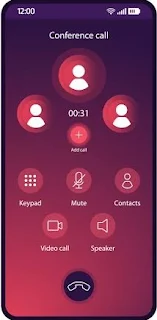A conference call is a telephone call in which someone talks to several people at the same time. It allows multiple participants to join a conversation, often for business meetings, remote collaboration, or discussions involving people in different locations.
Types of conference call.
There are various types of conference calls tailored to different needs:
1. **Audio Conference Call:** The most common type where participants join via phone, either traditional phone lines or VoIP.
2. **Video Conference Call:** Involves both audio and video, allowing participants to see each other. This is especially useful for remote collaboration.
3. **Web Conference:** Combines audio and visual elements with screen sharing, document sharing, and sometimes interactive features. Participants often join via a web link or meeting ID.
4. **Operator-Assisted Conference Call:** A more managed and professional service where an operator assists with tasks like participant roll call, Q&A sessions, and more.
5. **Reservationless Conference Call:** Participants can dial in at any time without scheduling in advance. This provides flexibility but may lack the structure of scheduled calls.
6. **Panel Interview Conference Call:** Used in hiring processes, where multiple interviewers can participate in interviewing a candidate remotely.
7. **Earnings Call:** Common in business, where companies report their financial results to analysts, shareholders, and the media.
The choice of conference call type depends on the specific requirements and objectives of the participants.
How it works?
Conference calls typically work by using a conference bridge, which is a specialized server or service that allows multiple telephone lines to be connected simultaneously. Here's a simplified overview:
1. **Scheduling the Call:** The organizer schedules a time for the conference call and provides participants with a phone number to dial and a unique access code.
2. **Dialing In:** Participants dial the specified phone number and enter the access code when prompted. This code ensures that they connect to the correct conference.
3. **Conference Bridge:** The conference bridge manages the connections, allowing all participants to hear each other. It can be hosted by a telecommunication service provider or through dedicated conferencing services.
4. **Controls:** The organizer and participants may have access to controls such as mute/unmute, participant list, and other features. These controls help manage the flow of the conversation.
5. **Ending the Call:** At the scheduled end time, the participants disconnect from the call. The organizer or the system may also have the ability to end the call for everyone.
Conference calls can be conducted using traditional telephone lines, Voice over Internet Protocol (VoIP), or specialized conferencing software, depending on the technology chosen by the organizer.
Conference call Service Providers?
There are several service providers that offer conference call services. Some well-known ones include:
1. **Zoom:** Known for its video conferencing, Zoom also provides audio-only conferencing services.
2. **Microsoft Teams:** Offers a comprehensive collaboration platform, including audio and video conferencing features.
3. **Cisco Webex:** Provides a range of conferencing solutions, including audio, video, and web conferencing.
4. **GoToMeeting:** Offers online meeting and conferencing solutions for businesses.
5. **Skype for Business:** While transitioning to Microsoft Teams, Skype for Business still provides conferencing capabilities.
6. **UberConference:** A user-friendly conferencing solution with features like screen sharing and document sharing.
7. **FreeConferenceCall.com:** Allows users to host free conference calls with audio, video, and screen sharing options.
8. **BlueJeans:** Provides video conferencing solutions for businesses and organizations.
9. **Google Meet:** Part of the Google Workspace, Google Meet offers video and audio conferencing features.
10. **RingCentral:** Offers cloud-based communication and collaboration solutions, including conference calling.
When choosing a service provider, consider factors like the number of participants, features offered, ease of use, and cost. Different providers cater to various needs, from small team meetings to large-scale corporate conferences.
